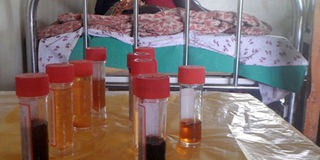Strange disease kills dozens in Manafwa

Intervention. Urine samples got from children admitted to Bugobelo Health IV in Manafwa District at the weekend. PHOTO BY FRED WAMBEDE
What you need to know:
- Manafwa District disease surveillance officer William Mandu urged parents to be vigilant and always report to the nearest designated health centre early enough, warning that the disease kills very fast.
A strange epidemic has struck Manafwa and Namisindwa districts, claiming unspecified number of lives and left dozens admitted to various hospitals
The disease, which mainly attacks children aged one and 10 with severe symptoms, including passing out bloody urine, was first reported in Bugobero Sub-county about three weeks ago but it spread to other sub-counties of Butiru, Sisuni, Khabutoola, Busukuya in Manafwa and to Namisindwa District. More than 40 children are reported to be admitted to different health centres but the actual number is yet to be confirmed.
District health officials, who preferred anonymity, said more than 14 children have died at community level but this could not be officially verified.
However, Dr Emma Oyese, the head of Bugobero Health Centre IV where the district has set up an emergency treatment centre, confirmed the deaths.
“I cannot comment on the number of children who have died until we come up with an official report but what I can say is some have died,” Dr Oyese told Daily Monitor.
Symptoms
He said by Saturday, more than 29 children had been admitted to Bugobero with symptoms of passing out bloody urine, paleness, lower abdominal pain, voting, anaemia, loss of appetite, high fever and general body weakness.
However, the district health officer, Dr Gideon Wamasebu, said a team of experts from the Ministry of Health visited the area and found the symptoms were associated with malaria.
“It is not a strange disease but complicated malaria. We have, as a result, strengthened their capacity to handle it,” he said.
The ministry public relations officer, Ms Vivian Serwanja, said their analysis suggests the disease is black water fever.
“What is happening is suspected black water fever but the team is still on the ground to identify possible exposures and recommend evidence-based control measures,” she said. Ms Serwanja said the most affected age group is 0 to nine years.
Blackwater fever is a complicated malaria infection in which red blood cells burst in the bloodstream, releasing haemoglobin directly into the blood vessels and into the urine, usually leading to kidney failure.
Mr Micheal Mityalo from Khabutoola Sub-county said her daughter was taken to a health centre after developing malaria-related symptoms and later started passing out bloody urine.
“We were surprised because this has never happened in our family. When we saw blood discharge from her private parts, we got scared and rushed her to the health centre. We were told it is a strange disease,” Mr Mityalo said.
Shortage of drugs
Ms Joyce Namutosi, a nurse at Bugobero Health Centre IV, said the number of children admitted was increasing daily yet the hospital is short of blood, drugs and lacks an ambulance to take referral cases.
“We have to refer the children to Mbale Hospital for blood transfusion but the parents cannot afford transport costs and we do not have an ambulance,” she said.
Manafwa District disease surveillance officer William Mandu urged parents to be vigilant and always report to the nearest designated health centre early enough, warning that the disease kills very fast.
Bubulo West MP Rose Mutonyi said she has informed Parliament about the strange epidemic and called on the Ministry of Health to restock the emergency centre and other health centres in the affected sub-counties with blood and drugs to contain the outbreak.




